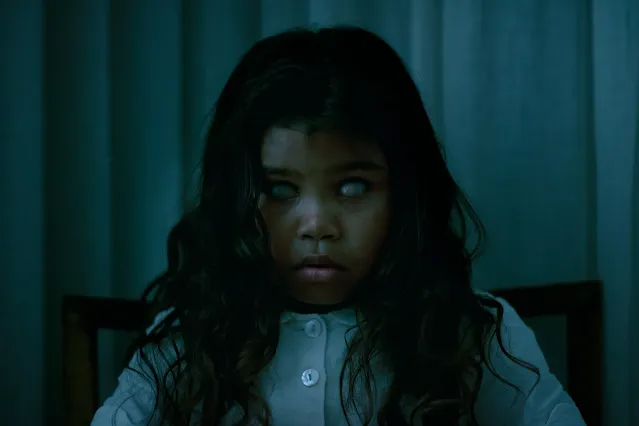My Thoughts On The Moogai
The Moogai centers on Sarah, an Aboriginal lawyer who, against the odds, manages to keep a veneer of control while balancing motherhood, a demanding career, and a supernatural infestation. Her husband Fergus is the quintessential supportive partner - Sarcasm fully intended.
Sarah’s nightmare begins when she starts seeing a ghostly entity with grotesquely elongated arms and a posse of white-eyed children, and of course, the source of this spectral chaos is none other than the Moogai - a child-snatching spirit drawn from Aboriginal folklore.
What follows is an exploration of Sarah’s mental unravelling, which Fergus greets with all the insight of a confused houseplant, and as Sarah’s paranoia deepens, their relationship starts to strain, and then the reappearance of Sarah’s estranged mother Ruth adds yet more complexity, to the fore.
The film attempts to juggle multiple genres simultaneously, as it dabbles in psychological horror, social critique drama, and supernatural horror, and it’s a bold trifecta, but the film frequently feels as if it’s tripping over its own limbs, unsure whether to lead with a ghost story, and the tonal risks are quite disorienting.
The opening sequence is arguably the film’s best part though - a visceral, harrowing flashback depicting Aboriginal children being hunted by white authorities, and it’s a powerful, unflinching scene that establishes the film’s emotional and historical stakes.
But this early apex casts a long shadow over the rest of the film, which struggles to maintain the same intensity or clarity of purpose, and what follows is a series of domestic vignettes centering on Sarah’s slow descent into fear and despair.
Cast wise, Shari Sebbens delivers a solid performance, with a grounded portrayal of exhaustion and terror, even when the script seems to forget its own tone and insists on repetitive screaming session, and Meyne Wyatt, is the well-intentioned husband whose emotional range rarely extends beyond mild bewilderment, and his character arc, or lack thereof, feels less like a fully fleshed-out role and more like a checklist item.
Supporting characters, from Sarah’s friends to her daughter Chloe, are relegated to the sidelines, more ornamental than essential, so much so that Chloe might as well be a static background prop.
And the film’s pacing is also another part that suffers, as while it clocks in at a modest runtime, the middle sections drag a lot, and are weighed down by repetitive scenes of Sarah wandering through dimly lit rooms, gasping at shadows as if it’s a new dance move.
The Moogai does deserves some credit though for its audacity in connecting a supernatural narrative to real world historical trauma, as the film’s metaphorical use of the Moogai spirit as a symbol of the intergenerational pain caused by the Stolen Generations is something rare within the horror genre, and it's when the film leans into this, it find moments of genuine emotional resonance, offering a horror experience that is as much about the ghosts of history as it is about the ghosts in the house.
Fans of slow-burn psychological horror will probably find things to like and appreciate here, but it's an imperfect yet ambitious film that stumbles under the weight of its own aspirations, but beneath the flaws lies a sincere and bold effort to merge horror with social commentary, and to make us confront the lingering shadows of colonial violence through the lens of genre cinema, so while it may not terrify you, it might just haunt you in a way that’s more about history and identity than thrills.
Read some more horror movie reviews:
Wake Up movie review
Kapkapiii movie review
Womb movie review
Best Wishes To All movie review
Death of a Unicorn movie review
825 Forest Road movie review
Sinners movie review


